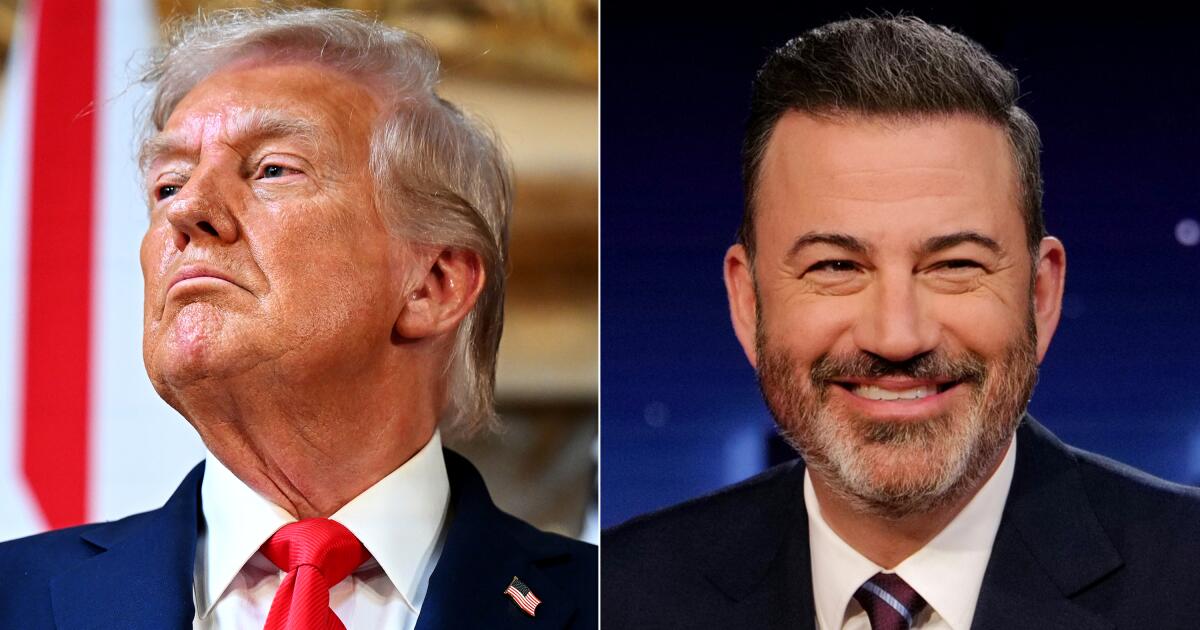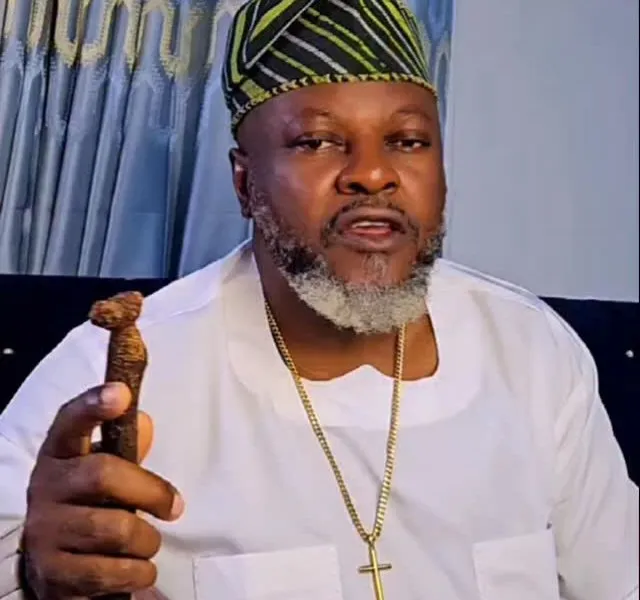
The return of Jimmy Kimmel to ABC’s airwaves flipped the political script, for a time aligning the late-night comedian with several conservative figures who staunchly disagree with federal regulators trying to shut him down over free speech — even as President Trump continued to threaten the network.
“I want to thank the people who don’t support my show and what I believe, but support my right to share those beliefs anyway,” Kimmel told viewers during his opening monologue Tuesday night.
Trump in recent days has ramped up efforts to stifle his political opposition and what he perceives to be liberal bias in media coverage through lawsuits and regulatory actions, a move that has increasingly concerned the president’s supporters and influential conservative personalities.
The firestorm over free speech came in the wake of comments Kimmel made about how the “MAGA gang” was trying to score political points from Charlie Kirk’s slaying. On a conservative podcast, Brendan Carr, a Trump loyalist who heads the Federal Communications Commission, accused Kimmel of “the sickest conduct” and suggested there could be regulatory consequences for local television stations whose programming did not serve the public interest.
After Disney took “Jimmy Kimmel Live!” off the air at ABC last week, some high-profile Trump allies worried the threat of regulating speech was taking it too far — and that conservatives could be next if the federal government were to follow through.
“If we embrace the FCC stripping licenses from anyone who says something you disagree with, the next Democrat president who gets in the White House will do this and will come after everyone right of center,” Sen. Ted Cruz (R-Tex.), a critic of Kimmel’s, said Wednesday on his podcast “Verdict with Ted Cruz,” reaffirming previous comments in which he likened Carr’s threats to mafia-like maneuvers. “That is a slippery slope to oblivion.”
Trump, however, was dismayed by Kimmel’s return and threatened legal action, following a pattern in which he has sued major media outlets over negative coverage of him.
“I think we are going to test ABC out on this. Let’s see how we do,” Trump wrote late Tuesday on his social media platform, suggesting a lawsuit against the network could potentially lead to a “lucrative” settlement. “A true bunch of losers! Let Jimmy Kimmel rot in his bad Ratings.”
Combined, Trump’s legal threats and Carr’s comments have fueled a sharp debate about free speech, and whether Trump and Carr are trying to level the playing field for conservative voices or launching a coordinated and illegal attack to silence liberal ones. As a result, Carr — the author of an FCC chapter in the right-wing Project 2025 playbook — has landed in a glaring media spotlight and as the target of a congressional inquiry.
Sen. Adam Schiff (D-Calif.) and eight other Democratic senators wrote a letter to Carr on Wednesday expressing “grave concern” over the FCC’s apparent role in Kimmel’s suspension, and demanded answers about the role the agency played in it and its justification.
“The FCC’s regulatory authority over broadcast licenses was never intended to serve as a weapon to silence criticism or punish satirical commentary,” the senators wrote. “Your agency’s mission is to serve the public interest, not to act as an enforcement arm for political retribution against media outlets that displease those in power.”
California Atty. Gen. Rob Bonta has also written to Carr, accusing the Trump administration of “waging a dangerous attack on those who dare to speak out against it” and calling on Carr to recommit to defending free speech, including by disavowing his previous remarks about Kimmel.
In the days after Kimmel was sidelined, Cruz and other influential conservatives, who have long trashed the longtime late-night host, voiced opposition to his situation based on concerns that the FCC may be trying to regulate speech on the airwaves.
“You don’t have to like what somebody says on TV to agree that the government shouldn’t be getting involved here,” former Senate Republican Leader Mitch McConnell of Kentucky said on a social media post Monday.
Conservative podcast host Joe Rogan said he did not “think the government should be involved, ever, in dictating what a comedian can or cannot say in a monologue” — and told conservatives they are “crazy” if they don’t think such tactics could be “used” against them. Candance Owens, a far-right influencer, said Kimmel’s suspension was an attack on free speech, and said she does not agree with the government controlling what can be said.
Ben Shapiro raised concerns about potential government overreach.
“I don’t want the FCC in the business of telling local affiliated that their licenses will be removed if they broadcast material that the FCC deems to be informationally false,” Shapiro said, warning that “one day the shoe will be on the other foot.”
Conservative podcaster Tucker Carlson said last week he does not want to see “bad actors” use Kirk’s killing as a means to restrict free speech, which he said is a cornerstone of Kirk’s legacy.
“You hope a year from now, the turmoil we’re seeing in the aftermath of his murder won’t be leveraged to bring hate speech laws to this country,” Carlson said.
In his opening monologue, Kimmel touched on the same theme. He said Carr’s tactics were “un-American” and likened them to what happens in authoritarian countries such as Russia.
“This show is not important,” he said. “What is important is that we get to live in a country that allows us to have a show like this.”
On the podcast last week, Carr called Kimmel’s remarks about Kirk’s alleged shooter “some of the sickest conduct possible.” He then said: “Frankly, when you see stuff like this, we can do this the easy way or the hard way. There are ways to change conduct, to take action, frankly, on Kimmel, or there’s going to be additional work for the FCC ahead.”
On Monday, Carr denied claims that he threatened to pull television stations’ licenses and that he played a role in Kimmel’s suspension, saying “that didn’t happen in any way, shape or form.”
“They’re completely misrepresenting the work of the FCC and what we’ve been doing,” he said during a conference in New York, accusing Democrats of engaging in a “campaign of projection and distortion.”
Carr said the FCC wants to empower local television station owners to “push back on national programmers, even when they think there’s some content that they don’t think in their judgment — not my judgment, but their judgment — makes sense for the local communities.”
What happened with Kimmel, Carr said, is that local television stations “for the first time in a long time stood up and said, ‘We don’t want to run that program, at least right now.’” He said Disney, a national programmer, then made its own business decision not to air Kimmel for a few days.
After Disney brought back the show, station owners Sinclair Broadcast Group and Nexstar Media Group said they would not be running it on their ABC affiliates, hinting to future conflicts that could play out in the media landscape.
Carr opened his Project 2025 chapter on the FCC by writing that the agency should “promote freedom of speech,” but has also sided with Trump in criticizing broadcasters for allegedly showing bias against conservatives and said that he would use the agency’s power to ensure that they better serve the “public interest.”
Bob Shrum, director of the USC Dornsife Center for the Political Future, said the political brawl over Kimmel has been interesting to watch — in part because of the bipartisan backlash to the suspension and the administration’s apparent influence on it.
“I’m encouraged by the fact that it’s not just Democrats who complained about this, it’s Republicans like Ted Cruz,” Shrum said. “That at least begins to set a deterrent for the federal government going too far on this.”
While Trump was angered by Kimmel’s return, Shrum found it notable that his social media post ended with the line: “Let Jimmy Kimmel rot in his bad Ratings.” It showed the limits the president sees on his power to wipe Kimmel from the airwaves, he said.
“That’s not the kind of last line that says, ‘We’re coming after you,’” Shrum said.



